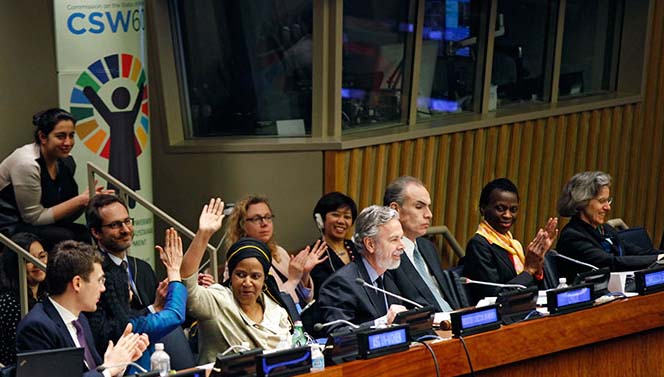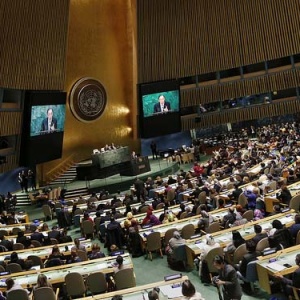Analysis: 60th Session of the Commission on the Status of Women
The 60th Session of the Commission on the Status of Women (CSW) held in March, had particular a significance in 2016.A set of agreed conclusions called for enhancing the basis for rapid progress, including stronger laws, policies and institutions, better data and scaled-up financing. UN Women says it sets high standards for driving implementation of the agenda for gender equality, empowerment of women and girls and the full realization of their human rights and freedoms.
(pic: CSW opening Photo: UN Women/Ryan Brown)
The following is adapted from a summary by UN Women’s Civil Society Section.
The annual session of CSW is always one of the largest and most engaging intergovernmental meetings of the United Nations and a premier global forum for policy dialogue and consensus building on gender equality. This year a record number took part, with over 120 government ministers and deputy or vice ministers, 1,825 senior officials and parliamentarians, and more than 4,000 civil society representatives gave voice to a range of issues in 197 meetings on site and some 450 offsite – and numerous other activities.
|
Summary Determinations of CSW:
The CSW urged state actions to:
|
The Agreed Conclusions were a result of a hard won consensus which ultimately conveyed the strong commitment of Member states to prioritize and propel effective implementation of the gender equality compact in the 2030 Agenda, in conjunction with the Beijing Platform for Action.
 The CSW stressed the critical urgency of integrating gender perspectives in cohesive government strategies across all government policies and programs.
The CSW stressed the critical urgency of integrating gender perspectives in cohesive government strategies across all government policies and programs.
Most importantly, it defined a roadmap for data, follow-up and review of the first ever universal and comprehensive sustainable development agenda, which would leave no woman and girl behind.
There was a specific commitment about women and girls who face multiple and intersecting forms of discrimination, marginalization and vulnerability.
The Agreed Conclusions are of profound importance as they affirm and vow to enact multiple commitments on gender equality and the empowerment of women forged across 2015 in a number of major International declarations, resolution and agreements.[1] pic: UN Women Executive Director Phumzile Mlambo-Ngcuka high-fives UN Women Deputy Executive Director Lakshmi Puri as the CSW Chair Antonio de Aguilar Patriota of Brazil announces the adoption of the agreement. Photo: UN Women/Ryan Brown
Concrete actions to accelerate and achieve gender equality by 2030 were identified, invoking the responsibility of governments, while outlining areas for greater collaboration with Civil Society Organisations. This could include women’s groups along with faith-based, employer, or trade union groupings, socially responsible segments of the private sector and the media.
The CSW also signalled an unprecedented strategic pact to engage, partner, support and resource those sectors in an open and transparent way. Twice within that pact, reference to feminists and to women’s human rights defenders were secured. UN Women’s Civil Society says this constituted a big win which must be used to expand the democratic space for holding governments accountable.
CSW also establishes ground breaking parameters for engaging men and boys as agents and beneficiaries of change. It also commits to transform laws and policies, and equally vows to change social norms that breed and perpetuate discrimination and violence.
For a full analysis report of the 60th Session of the Commission on the Status of Women (CSW) by Lakshmi Puri, UN Assistant Secretary-General and Deputy Executive Director of UN Women, see attachment below.
IAWRT held a parallel event to the CSW, Exploring strategies to eliminate gender inequality in the media.
[1] from the Political Declaration on the 20th anniversary of the Beijing Declaration and Platform for Action (BDPfA), the Addis Ababa Action Agenda, the 15th anniversary of Security Council Resolution 1325 on Women, Peace and Security and UNSC Resolution 2242, the Paris Agreement on Climate Change along with the UN Women and Government of China co-organized Global Leaders’ Meeting of 27 September 2015








